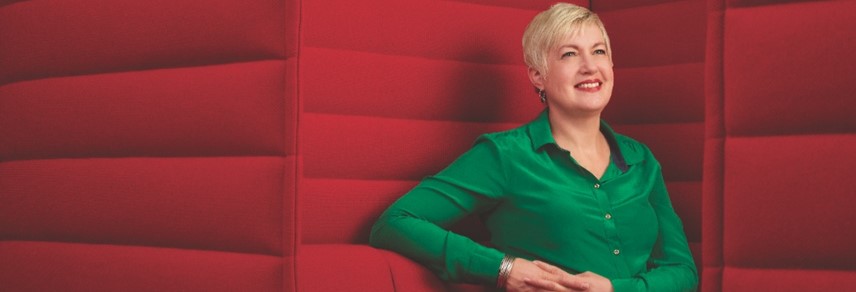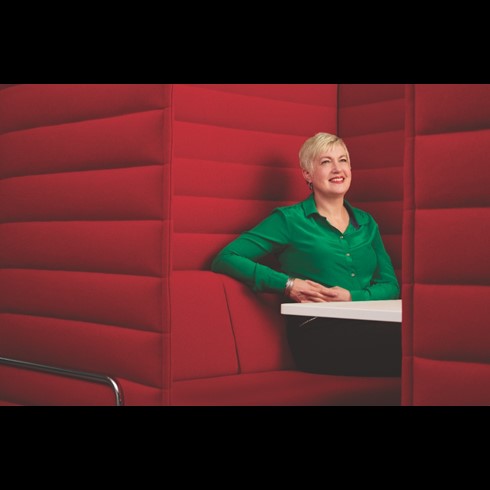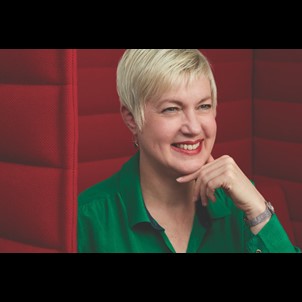
ACROSS THE MAP
Charting a course around the world, Carole Scott has made a veritable road map of a career in communications. Brittany Golob talks travel, career progression and novel writing with the Henkel communicator

Photographs by Jeff Leyshon
"I just am a communicator. I think I just have always been a communicator,” Carole Scott, head of corporate communications at Henkel, says. The road to communications was not always clear for the Oxford graduate, but finding her way around the world led to Scott finding her way into communications. And it was the journey of a lifetime.
“I didn’t have a clue what I wanted to do,” Scott says, about graduation from Oxford, where she achieved a degree in politics, philosophy and economics – alongside many who would go on to careers in national politics. Though a high school politics class had sparked her love for debate and for understanding the issues facing the world today, she had little interest in climbing “the greasy pole of politics.”
Finding a path to communications became the work of many years. After a childhood moving from Scotland, around the UK and finally to Berkshire – where she promptly lost her Midlands accent – Scott turned to travel for inspiration. Her gap year was spent putting her German language A-level to use in the German aluminium industry with a short placement at Almet. But she soon left Stuttgart for the welcoming climes of Boston, where she was an au pair for her aunt’s recent delivery of twins, and their two year-old brother. A month spent travelling through Europe led her to Tuscany before starting university.
Though she loved her time at university – spent singing, debating, acting and making friends – an unsatisfactory visit to the careers office at Oxford left Scott wondering what jobs were out there for a graduate with little interest in working in accountancy, law or politics.
“I was very idealistic. I knew I really wanted to do something that had a social good or a meaning to it, rather than just making money,” Scott said of eschewing corporate options. She found a role with SANE, a mental health charity, as a fundraiser. After a few years, she moved into a corporate fundraising role with Centrepoint, a charity that works with homeless young people. However, fundraising was not to be a long-term home for Scott. “I loved the charity,” she says. “But the job wasn’t quite right for me.”
Scott turned to travel once again and, alone with her backpack, trekked through South America for six months. It was her first experience travelling alone and she spent time in Venezuela, Ecuador, Peru and Bolivia. But the ever-friendly Scott made friends along the way, two of whom she considers close friends to this day. “It was difficult, but amazing,” she says of the trip. “I’m really proud that I did it. But I would say it set me back career-wise because when I got back, within a year it felt like all my friends were settling down and they had these great careers. Whereas I got back and I didn’t want to be a fundraiser.”
In the late 1990s, it was less common to change career paths than it is now. Hoping for a shift away from fundraising, she took a maternity cover role with the Imperial Cancer Research Fund, now Cancer Research UK, and then another fundraising job for the Museum of Modern Art in Oxford. However, she swiftly found a route into communications. “That’s where my key career transition happened,” she says. She applied for a newly-opened post running press and marketing at the museum and, on her entreé into communications thought, “Oh I see. This is what I was supposed to be doing! No one at university talked about careers in communications. I didn’t know what PR was. Because nobody had ever talked about it as a job you can do, I had never realised that there were jobs in communications. I just had no knowledge of it.”
Finally, Scott’s work in fundraising made sense as she realised what she had enjoyed about previous roles was in communicating the message or purpose of each organisation to the relevant audiences.
“I know that I belong in business. There’s something about the dynamism of being in a business that has strategies and long term visions”
After three years, she moved into a role as media manager at the YWCA. The charity had been around for 200 years, but had no press office and a limited communications function. Thus Scott was charged with helping to set up a press office – a task that the team achieved ably, increasing the number of press mentions from 20 to 200 in only a year. One of the highlights, she says, was changing the perceptions about teenage mums in the media as well as the perception of the media among teenage mums. For a prominent Guardian spread, Scott’s team worked closely with the paper and the interviewees, “We worked with the editor for quite a few weeks before making sure that we could get young mums to be interviewed and have a voice in the media that was a positive experience for them because so many of them had had a very negative experience.”
Despite a successful and rewarding three years with the YWCA, Scott felt the unmistakable pull of adventure once more. “In 2005, I took another career break because at that point I knew I didn’t want to be in the charity sector any longer. By that stage I was in my mid-30s and I was really tired of not earning very much money.” The routes to further stability were either through senior positions in the charity sector – which could mean battling against inefficient decision making processes – or a change of scenery.
Scott found a home at a tour company called Explore – which offers guided travel from Antarctica to Amsterdam – and spent six months beating a path through Syria, Lebanon and Jordan. “I was very lucky,” Scott says, referencing the massive destruction that has befallen Syria since the country’s civil war began in 2011.
Travelling through historical landmark sites like Palmyra, Aleppo and Krak des Chevaliers, Scott added another stamp in her passport and the chance to visit now-destroyed monuments. “The job was really intense,” she says, “But I’m really glad I got to go to those places. I still get very emotional about it. As individuals, what can we do? We can make donations and that’s great. We could send out support to Calais when the jungle was there. But we know that we can’t change our own government’s attitude to how many refugees they’ll take in. We can’t change what Putin and Assad are doing.”
Fortunately, some of the Levant’s jewels are still intact. Petra, an archaeological and architectural marvel in southern Jordan, is one of Scott’s favourite places. And its rippled rock walls and mysterious building style inspired another route in Scott’s life. She is now the author of a book, the Broken Heart Repair Plan, set partially in Jordan, that she wrote following her travels.
 |
Curriculum vitae: Carole Scott Present Head of corporate communications, Henkel 2013 - 2016 Director of external relations and media, the Oxford Martin School, University of Oxford 2006 - 2013 Director, Bottle 2005 Tour leader, Explore Worldwide 2001 - 2005 Media manager, YWCA 1998 - 2001 PR and marketing officer, Museum of Modern Art, Oxford 1997 - 1998 Regional fundraising manager, Imperial Cancer Research Fund (CRUK) 1993 - 1996 Corporate fundraiser, Centrepoint |
Through a bit of serendipity on a yoga retreat in Greece, Scott found a creative writing instructor whose course had been cancelled and instead ran workshops for the yoga-doers. Thus, Scott finalised the plans for the novel she would write over the course of the next three years.
By 2015, it had been collecting dust in a computer file for 24 months or so and Scott decided to self publish. Between Boxing Day and 29 December 2015, the novel was finished, proofread and complete with cover art and ready to publish as an e-book on Amazon. But her PR roots shone through even in publishing as she answered a call on Radio 4‘s Woman’s Hour asking women to share their big plans for 2016 with a plug for her newly-published book.
But back in 2005 and newly-returned from the Levant, Scott looked to chart a new course for herself in communications. She found a home at Bottle, a mid-sized Oxford-based PR agency then run by co-founders CEO Claire Florey and MD Will Cairns. Scott worked in account management for clients as wide-ranging as AXA PPP Healthcare and Poundland.
A self-styled generalist, Scott, “Liked anything that was a challenger brand.” PR for Poundland allowed for creativity and a foray into investor relations that helped secure a price for the company’s next private equity sale – and its positioning as a retailer among the likes of Tesco and Argos, not just a cheap shop.
“What I particularly liked was where you got something that’s consumer focused but you think of other things to do with it so you don’t just take the obvious approach. That’s what I enjoyed with all of my clients – working with them at a strategic level to say, ‘What is your end goal here?’”
But agency life was not all about client work. Scott soon became a director and helped to run the consultancy. The management team achieved growth – in terms of client wins and employees – and moved the company into the £2m-plus per year turnover bracket. But Scott enjoyed defining the vision and values of the organisation most. “We developed a set of four core values and we wove those values through the whole organisation from recruitment through to training to how we did our feedback to clients to how we did our pitches.” That ultimately helped in recruitment too, as the Oxford- based agency secured talented employees despite its location outside the communications hub of London.
After spending seven years at Bottle – by far her longest tenure in any job – Scott decided it was time for a new challenge. Back to Oxford Scott went for a role with the Oxford Martin School, where she lead communications for the next three or so years. It was a rewarding experience, but not one that would define the rest of her career, because, Scott says, “I know that I belong in business. There’s something about the dynamism of being in a business that has strategies and long term visions.”
Thus, in September of this year, Scott took up the role at Henkel. Though she, like many in the UK, had never heard of the business before, she soon learned that it was the heritage brand behind household names like Pritt Stick, Persil and Sellotape. The German FMCG company is prominent in its home region, but its consumer brands are better known in the UK and Ireland. The challenge posed to Scott is to change that.
Though she has only been with the company for a few months, it seems that Scott has finally found a home in communications. She lauds the organisation’s sustainability strategies, its office environment and culture and its approach to internal communications. An upcoming trip to Dusseldorf in January even has Scott practicing her latent German language skills to better integrate with her German-speaking colleagues. But Scott’s world map would be incomplete without her contribution to global culture through her time as a games maker at the London 2012 Olympics. She was one of 12 volunteer journalists who published the eight-page newspaper every day of the Games for the international Olympic village. Scott calls it the, “Experience of a lifetime.”
However, though her journey through communications – and the world – has led to Henkel’s Hemel Hempstead campus, Scott says the path can be made smoother for fellow communicators. She says new degree courses in communications at places like the University of Bournemouth, the new take-up of PR apprenticeships and better outreach is changing things for students and graduates. However, her own experience means there is much to be done in terms of education about careers in communications. Scott’s advice to others like her, “Try not to get anxious about the fact that you don’t have a vocation straight off. Try as many different things as you can or it takes for you to find the thing that you really like. Stay with it. Breathe.”
Scott has persisted. She has travelled the world and the world of communications. And she has found her place in the world as a communicator. Where is she off to next? New York, to celebrate her 50th birthday.



